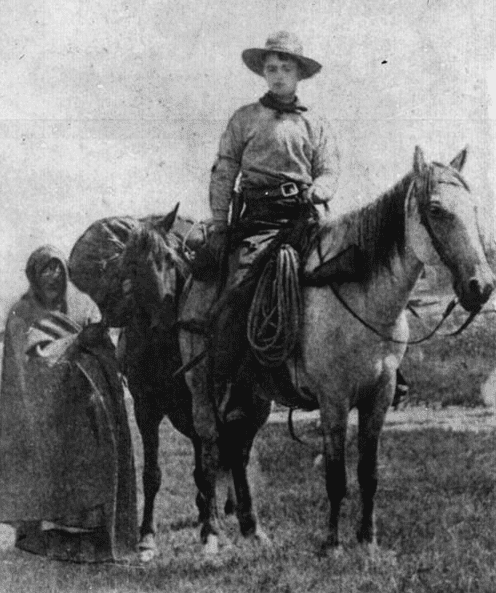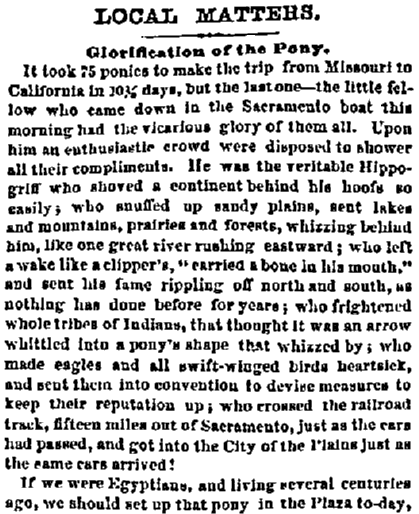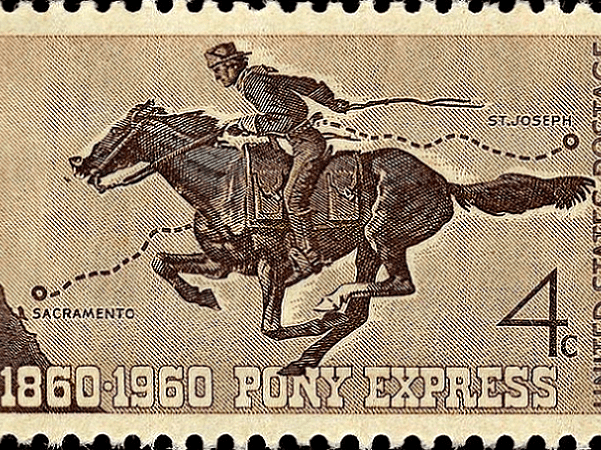The Pony Express is an enduring part of the lore of the Wild West: daring riders braving vast stretches of wilderness, hostile Indians, and rough weather to carry the mail that connected the East Coast with the West. The dazzling promise made, and kept, by the Pony Express was to deliver mail between St. Joseph, Missouri, and San Francisco, California, covering the 1,900 miles in ten days. Railroads carried the mail between the East Coast and St. Joseph to initiate or complete the deliveries. Because its legend is so large, few people realize the Pony Express only existed for 18 months, from April 1860 until October 1861 – put out of business by the completion of the transcontinental telegraph.

On 14 April 1860, the first westbound Pony Express rider and horse arrived in San Francisco at 1:00 in the morning, carrying mail that had left St. Joseph a little over 10 days earlier. The promise had been kept, and such speedy delivery seemed a miracle in the days before the transcontinental telegraph or railroad. San Francisco has always been a city that knows how to celebrate big occasions, and this historic first was no exception, as the following newspaper article details.

Here is a transcription of this article:
Glorification of the Pony
It took 75 ponies to make the trip from Missouri to California in 10½ days, but the last one – the little fellow who came down in the Sacramento boat this morning – had the vicarious glory of them all. Upon him an enthusiastic crowd were disposed to shower all their compliments. He was the veritable Hippogriff who shoved a continent behind his hooves so easily; who snuffed up sandy plains, sent lakes and mountains, prairies and forests, whizzing behind him, like one great river rushing eastward; who left a wake like a clipper’s, “carried a bone in his mouth,” and sent his fame rippling off north and south, as nothing has done before for years; who frightened whole tribes of Indians, that thought it was an arrow whittled into a pony’s shape that whizzed by; who made eagles and all swift-winged birds heartsick, and sent them into convention to devise measures to keep their reputation up; who crossed the railroad track, fifteen miles out of Sacramento, just as the cars had passed, and got into the City of the Plains just as the same cars arrived!
If we were Egyptians, and living several centuries ago, we should set up that pony in the Plaza today, and all of us go a-worshipping him. But as we are not, but simple Californians, many of us spending four or five precious months in getting here, all we could do was to go down and glorify him on his arrival this morning.
The boat waited for the Pony Express at Sacramento until 5 o’clock yesterday afternoon. The instant it arrived it came on board, and the Antelope put on all steam to accomplish an early trip.
Meanwhile, at the theatres it had been announced that on the landing of the boat there would be ceremonies of reception, music, jollification and some speeches; possibly, the last statement contributed to send large portions of the people home; still, many determined to make a night of it, and never mind the headaches this morning. The California Band (18 pieces) traveled up and down the streets, waking all the echoes, fetching out the boys, and making night melodious. Bonfires were kindled here and there – on the Plaza, on the wharves, wherever there was an old tar barrel to steal, a gathering of shavings, or a dry-goods box to burn. The Monumental bell rang out a larger district than the city will know for several centuries to come; the Police, like Barkls, was willin’, and the red shirts as they came rushing to see where the fire was, got out their engines, joined into the procession, lighted their torches, and would not go home till morning. A stranger would have thought the river was on fire, or a war proclaimed against the Naiads. The organized turn-out reached the foot of Broadway, at midnight. With waltzes and Yankee Doodle, the airs of all the nations, and several improvised black-oak dances, the spirits were maintained until near one o’clock, when the Antelope came steaming down, wheeled, threw out her hawsers, was made fast, and the glorified pony walked ashore.
The crowd cheered till their throats were sore; the Band played as if they would crack their cheeks, and risk laming their elbows for life; the boys stirred up their bonfires and the speech makers studied their points. The procession re-formed, opened right and left, and the pony, (a bright bay, when the torches flashed their light upon him, but of the color of the crowd otherwise), paced gaily up to his stand. The line closed again, the Band went ahead, the firemen followed with their machines, the centre of attraction, the Hippogriff, came next, and citizens fell in behind. There was one lady on the ground. As the pony trotted into line, she tore the ribbons from her bonnet and tied them around his neck. All moved up then to the vicinity of the Bulletin office and halted on Montgomery street, just opposite, at the Pony Express. While the 25 letters that were brought were being distributed, the speech makers were proceeding to uncork the bottles of their eloquence. Their friends said “hear, hear,” but the boys would leave it to the Pony. He considered a moment, eyed the ribbon round his neck, looked a bit sleepy, thought of his oats, and uttered a loud neigh. So the speeches were corked down again, the speech makers tied comforters around their throats, the Dashaways cheered hoarsely, the rag-tag-and-bobtail took something warm, the morning papers went to press, the crowd to bed, and the Pony to his stable.
The little fellow is in good condition this morning. The Committees had not begun to call upon him when we went to press, the military had not been introduced, the Supervisors had not called a special meeting to vote him the freedom of the city.
Long live the Pony!
The Time That the Pony Made
The following, taken from the Way-bill of the Pony Express, shows the time made on the late notable trip from St. Joseph to San Francisco:
Left St. Joseph, Mo.: 6:30 P.M., on 3d April.
Arrived at Salt Lake City: 6:30 P.M., on 9th April.
Carson City: 2:30 P.M., on 12th April.
Strawberry Valley: 4:35 A.M., on 13th April.
Placerville: 2:00 P.M., on 13th April.
Sacramento: 5:30 P.M., on 13th April.
San Francisco: 1:00 A.M., on 14th April.
Note: An online collection of newspapers, such as GenealogyBank’s Historical Newspaper Archives, is not only a great way to learn about the lives of your ancestors – the old newspaper articles also help you understand American history and the times your ancestors lived in, and the news they talked about and read in their local papers. Do you have any old family letters with the Pony Express stamp on them? Please share your stories with us in the comments section.
Related Articles:
